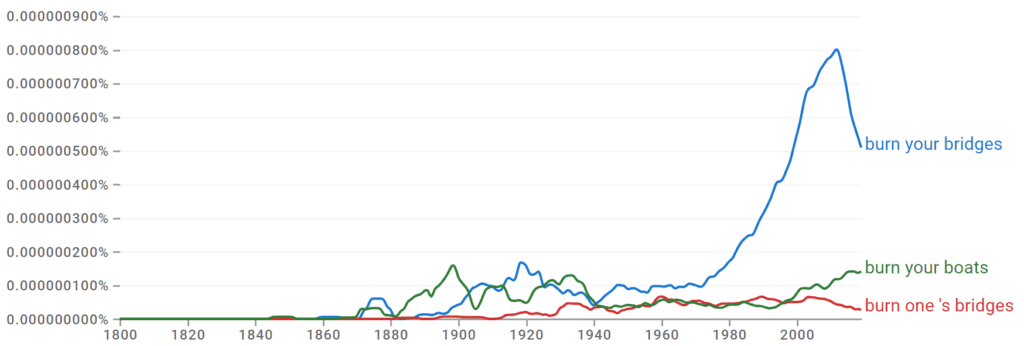Idioms are words and phrases that originate with literal meanings but are now more often used in a figurative sense to create comparisons within the English language.
To burn one’s bridge is an idiomatic phrase popularly used to highlight an action or behavior that cannot be retracted. It can also be heard as to burn one’s boat, but this variation isn’t as well-known.
Let’s learn about the origins and meanings of these idiomatic phrases.
Burn One’s Boat or Burn One’s Bridges: What’s the Difference?

To burn one’s boat or to burn one’s bridge means the same thing: to do or have done something that cannot be undone or that is difficult to undo. It is likely that to burn one’s boats is the older literal reference, and both phrases likely originated due to military strategy.
We’ll take a closer look at the origins below.
What Does It Mean to Burn One’s Bridges?
To burn one’s bridges or to burn one’s boats means to do something that is not easily undone or to do something that makes returning to one’s original state an impossible task. It infers that you will have cut yourself off from a chance of redemption or forgiveness and that you are staking all you have on your success.
For example:
- If you had wished for a reconciliation, you probably shouldn’t have burned your bridges with her when you broke up via text message.
- Make sure to prepare for the conference and avoid burning bridges with the competition. You never know what sort of networking may come from those companies in the future.
Most often, the idioms to burn one’s bridges and to burn one’s boats are used in the negative sense, as in don’t burn your bridges or don’t burn your boats. These are admonitions that are meant to discourage someone from leaving a situation in an irredeemable manner. For instance, if someone quits a job by hurling an insulting tirade at his boss, he will not be rehired and will not receive a favorable reference from that person.
For example:
- Unfortunately, I won’t be able to ask for my job back after walking out the way I did. I burned my bridges when I didn’t give notice and then made an offensive gesture to my boss on my way out.
Origins of Burn One’s Bridges

To literally burn one’s bridges or boats likely has its origins in military campaign maneuvers. It is said the great Caesar commanded his legions to burn the bridges behind him after crossing the Rubicon in 49 B.C. (another idiomatic term used today to declare there is no turning back).
In doing so, he both kept his army from turning back and made it more difficult for anyone behind him to follow.
A second military example can be seen when Tariq Ibn Zyad, a Muslim commander, led his forces into Iberia, Spain, in 711 A.D. After he crossed the Strait of Gibraltar (named after him), he had his ships burned to symbolically declare there was no turning back.
These physical practices are seen throughout history and have been documented in various wars, including the American Civil War, during which the terms became more popular to use in a figurative sense.
Although to burn your bridge or boat means to cut off your chance of retreat and to stake everything on victory, it is used in a modern sense that once something is done, it is near impossible to be undone.
Let’s Review
To burn your bridges (or boats) is a popular modern-day saying which has its roots deeply embedded in ancient military campaign techniques. Literally, the term means to burn bridges or ships to slow an advancing army behind you and to block the retreat of your own army, forcing your troops to fight towards victory or death.
Today, the term means you’ve done something that cannot be undone or forgiven. If you’ve burned bridges with someone, it probably isn’t worth your time trying to make amends.
Related Articles:
